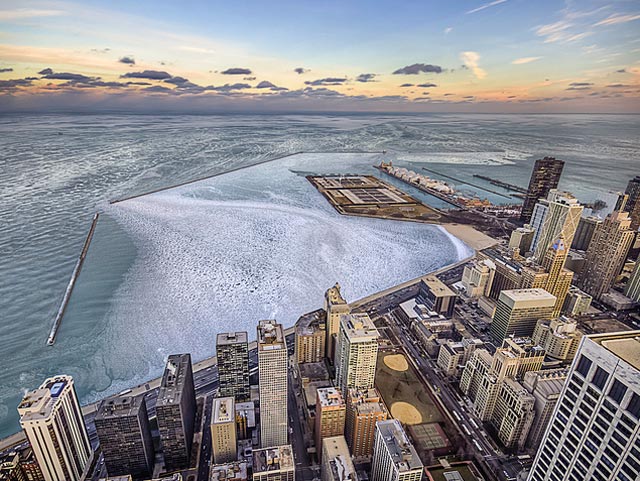The Great Lakes Are Melting Away
By JoshMogerman in News on Mar 9, 2013 10:00PM
Things just aren’t that great in the Great Lakes right now. Low water levels are clogging ports, turning shorelines into mud flats and messing up all manner of infrastructure. Invasive species are choking out local critters. And now there's news of shrinking ice cover. That last one doesn't seem like a big deal—after all, you don’t see people playing hockey on Lake Michigan—but it's really a doozy, because it impacts everything else.
USA Today picked up a story out of Michigan that notes the scope of the problem:
Scientists blame global warming. Hotter days mean warmer water.And the impact has been even worse in our neck of the woods. Lake Michigan saw the second biggest decrease, with a loss of 77% of its icepack in that time.
…
Ice cover has decreased nearly 70% on the five Great Lakes since the early 1970s, according to the National Oceanic and Atmospheric Administration. The five Great Lakes hold 20% of the world's fresh water and have more than 11,000 miles of shoreline.
Losing ice cover is a big deal. The frozen cap is essential for stabilizing vulnerable shorelines at an otherwise brutal time of year. Without it, winter’s strong, cold winds come into contact with more surface water, which causes water to evaporate. And that's believed to be a significant contributing factor to Lake Michigan’s historic low levels this year. In the Great Lakes’ iconic national parks like Sleeping Bear Dunes and Indiana Dunes National Lakeshore, the lack of ice means that elevated winter wave action and unobstructed winds are battering the shoreline and threatening to scour away their namesake sand hills. That lack of cover also puts some native fish species at risk by scouring away spawning habitat and exposing eggs to the elements.
And of course, no ice on the Great Lakes means no ice balls. Nobody wants that.
Much of this stuff was predicted long ago by the climate scientists. So the next time somebody questions you about climate change, just point to the Lake and hope that we can get our carbon pollution act together quickly enough to at least keep the Great Lakes better than average lakes.
